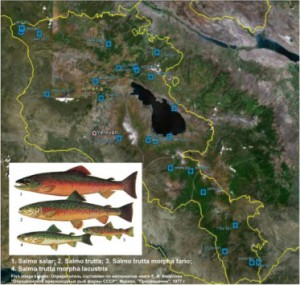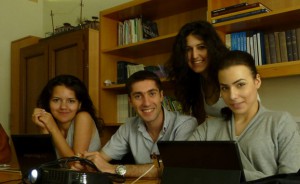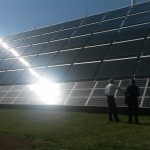Reintroduction of the Brown Trout in Armenia’s Rivers Studied by AUA Acopian Center for the Environment
 Overfishing in the 1990s has led to a collapse of Brown Trout (Salmo trutta morpha fario) stocks throughout Armenia. This species, once available abundantly in all of Armenia’s provinces, is currently found in fewer than 20% of surveyed rivers. To determine the suitability for its reintroduction, the AUA Acopian Center for the Environment with support from GIZ, the German Organization for International Cooperation, has conducted an extensive survey of physical and chemical properties of 22 rivers and streams in 7 provinces of Armenia.
Overfishing in the 1990s has led to a collapse of Brown Trout (Salmo trutta morpha fario) stocks throughout Armenia. This species, once available abundantly in all of Armenia’s provinces, is currently found in fewer than 20% of surveyed rivers. To determine the suitability for its reintroduction, the AUA Acopian Center for the Environment with support from GIZ, the German Organization for International Cooperation, has conducted an extensive survey of physical and chemical properties of 22 rivers and streams in 7 provinces of Armenia.
“The results of the survey are promising,” says Dr. Karen Aghababyan, chief scientist of the AUA Acopian Center and the study’s principal investigator. “Most rivers studied are suitable for reintroduction of the species. Their oxygen and pH levels were within the range preferred by the Brown Trout, and most sites had appropriate levels of ammonia and carbon dioxide, as well as enough benthic invertebrates to serve as food for the reintroduced fish,” explains Dr. Aghababyan.
In addition to scouting river sites, the AUA Acopian Center researchers found an appropriate brood stock with which to populate the rivers in question. To this end, the Center has collaborated with a fish farm that had Brown Trout captured wild in the Arpa River in 2009. This trout, which has not interbred with other fish species and has not gone through artificial selection, caries all the genes of the wild population and is suitable for introduction into the native stocks.
For many decades, the Brown Trout has been a staple fish in diets worldwide. In most parts of the world, Brown Trout is interbred with local populations, resulting in fish that is genetically different from their ancestors. Very few places on Earth are home to genetically pure Brown Trout. Armenia is one of these places, its mountainous rivers providing protection from interbreeding with non-indigenous species.
A successful reintroduction of a fish species needs more than adequate water conditions and pure breed. “We also need to ensure that the site is protected from poachers. Communities close to these fish populations have to have economic incentive to protect them. Local stewardship of the fish stock has to be worked into the reintroduction,” says Dr. Aghababyan.
Batumi Raptor Count and AUA Acopian Center Continue to Partner
AUA Acopian Center for the Environment continues its cooperation with the Batumi Raptor Count (BRC) by developing and delivering environmental education programs to youth from all parts of the Caucasus. This year, Hasmik Ter-Voskanyan (in August) and Siranush Tumanyan (in September) led youth groups, including some from Armenia.
In early September, Dr. Karen Aghababyan, AUA Acopian Center chief scientist, attended the International Batumi Bird Festival organized by BRC. During his visit, Dr. Aghababyan discussed opportunities for expanding cooperation between the organizations through development of nature-based tourism as well as strengthening environmental-education and bird-monitoring programs.
“This is a relationship we want to develop further,” says Alen Amirkhanian, director of the AUA Acopian Center. “Batumi provides an unparalleled setting in the Caucasus to educate and conduct research on the environment. Importantly we are able to do this jointly with people from all parts of the Caucasus and Europe. Developing this type of cooperation is essential for addressing environmental protection needs,” says Amirkhanian.
BRC is a vital nature conservation program in the region. It monitors the more than 850,000 birds of prey that migrate through the “Batumi Bottleneck” every fall. It also works to protect the birds from illegal shootings and trappings, practices that continue to this day.
Batumi is a Black Sea coastal city in the Ajara region of the Republic of Georgia.
 The AUA Acopian Center for the Environment, in cooperation with the UK-based Fauna and Flora International (FFI), has launched a baseline study to better understand human-wildlife conflicts and approaches to mitigating them.
The AUA Acopian Center for the Environment, in cooperation with the UK-based Fauna and Flora International (FFI), has launched a baseline study to better understand human-wildlife conflicts and approaches to mitigating them.
The abundance of livestock and other foodstuff, coupled with proximity to wildlife habitats, makes villages vulnerable to animals like wolves and bears. Often the threat is not physically against humans but against their economic assets. Wolves kill sheep, cows, and fowl, while bears damage fruit trees, destroy beehives, and deplete honey supplies. Over time these can take a heavy economic toll on villages that are surviving on meager means.
Before suffering heavy economic damage, however, villagers typically resort to killing the wolves or the bears, dealing a blow to an already tattered ecosystem. According to official statistics, 170 wolves have been killed during just three months of 2012.
FFI has been involved in human-wildlife conflict mitigation projects for many years, working extensively in Southeast Asia, Eastern Europe and, most recently, in the Republic of Georgia. Through a program that combines direct intervention, raising awareness, and market-based innovation, the FFI initiative has seen a marked improvement in the attitudes of livestock farmers towards wolves.
The AUA ACE researchers, all AUA students, are led by Dr. Karen Aghababyan, AUA ACE chief scientist, in studying nine rural communities across Armenia as well as the habitat conditions of the wildlife.
The project, expected to be completed by end of this year, will not only give students the opportunity to gain hands-on experience in the field, but will also contribute to finding solutions to preserving biodiversity while ensuring economic wellbeing in rural communities.
Duration: July 2013 – June 2015
American University of Armenia is a Partner for WASTEnet-a Black Sea network promoting natural integrated WAStewater Treatment SystEms within Joint Operational Programme “BLACK SEA BASIN 2007-2013”.
The project’s aim is through sharing resources and competencies for environmental protection and conservation and by promoting cooperation initiatives targeted at innovation in technologies and management of Waste and Wastewater Management Systems to motivate the widest possible audience of local and regional authorities of the participating Black Sea countries to develop and apply Natural Treatment Systems and in particular the Constructed Wetlands for the wastewater treatment of the remote rural communities.
Start Date: 01 July 2013
End Date: 30.06.2015
Visit Project Website: http://www.waste-net.info/
If you are a participant of the 1st “International Scientific Conference on “Sustainable Solutions to Wastewater Management”, please visit here for more information about accommodation.
American University of Armenia is a Partner for BSBEEP-Black Sea Building Energy Efficiency Plan within Joint Operational Programme “BLACK SEA BASIN 2007-2013”.
The aim of the project is to support cross border partnership for economic and social development based on combined resources and to create administrative capacity for the design and implementation of local development polices. The project focuses on the establishment of a knowledge and experience exchange network aiming at the promotion of buildings energy efficiency. The network will engage a wide spectrum of organizations such as local and regional authorities, universities and research centers and NGOs which will help promoting energy efficiency in the buildings at local and regional level. Meanwhile, it will focus on raising awareness and mobilizing private sector and leverage funds to support future initiatives.
Start Date: 01 June 2013
End Date: 31 May 2015
Second Project Meeting, Yerevan, Armenia (Energy Efficiency in Buildings: Challenges and Opportunities)
To access the Project outcomes and reports, please click on the links below. (English version)
Visit Project Website: www.bsbeep.com
 YEREVAN, Armenia – Times when it was necessary to travel outside Armenia in order to see examples of modern energy efficient architecture are long gone.
YEREVAN, Armenia – Times when it was necessary to travel outside Armenia in order to see examples of modern energy efficient architecture are long gone.
From May 18 – 21, 2015, the American University of Armenia (AUA) Acopian Center for the Environment organized a national study tour on energy efficiency, renewable energy, and other eco solutions in buildings for a group of 15 municipal workers, builders, academics, and NGO members from Syunik region of Armenia.
The national study tour aimed at showing municipal workers, construction companies, academics, and NGOs of Syunik region about successful implementation of solutions for energy efficiency in buildings; as well as using this national study tour as media content to raise awareness about energy efficiency in buildings nationally and in each city that participants visited. The study tour participants visited the pilot buildings by UNDP, the Avedisyan and Dilijan UWC schools and the Gyumri Caritas rehabilitation center.
“To date we have a number of successes and best practices in Armenia with respect to energy efficiency, renewable energy, and overall eco solutions to the built environment – successes that are acknowledged by world-famous environmental certification agencies and are authenticated by corresponding certifications,” said Mr. Hayk Harutyunyan, Deputy Minister of the RA Ministry of Energy and Natural Resources.
Mr. Alen Amirkhanian, Director of the AUA Acopian Center for the Environment, stated, “The role of the American University of Armenia and universities overall should be to collect these practices and experiences and make them accessible and useful for the public.”
The study tour is being organized within the EU Black Sea Buildings Energy Efficiency Plan (BSBEEP) project, which aims at establishing strong regional partnerships and cooperation among Black Sea countries through the reinforcement of local administrative capacities in the sector of energy efficiency in buildings, a sector with major environmental and economic impacts locally and globally.
To access the Project outcomes and reports, please click on the links below. (English version)
The overall aim of the SUAFRI-EPC project is to bridge the gap between Agri-Food research and innovation in Eastern Partnering Countries (EPC) by bringing together all actors of the knowledge value chain and raising their awareness on how to uptake research results into innovation. SUAFRI-EPC is supporting the Agri-Food sector and community in EPC by developing the basis for an efficient “Research to Innovation – R2I” process with the support of European partnering specialists.
The project will consist in the following activities:
The SUAFRI-EPC project aims also to cooperate with other European projects and initiatives targeting EPC countries, under ‘Cluster joint activities’. Cluster activities will consist in organising and contributing to joint events, exchange of information, and support current projects targeting EPC countries.
This pilot project aims to develop new production methods in aquaculture and apiculture in order to optimize production costs and increase environmental sustainability. It will be implemented via training and exchange of experts between the American University of Armenia (AUA) and the Danish company Dianova.
During the first year, the activities will be focused on the topic of sustainable aquaculture. The Danish experts will organize a number of training sessions on water recirculation systems, monitoring of effluents from aquaculture facilities, disease monitoring and control systems, and quality parameters.
During the second year, the team will continue its work on aquaculture but will also exchange on apiculture topic related to the production of honey. The interest of AUA is to learn more on the formalization of existing practices on prevention of bee diseases; and the creation of guideline for honey processing.
Related articles: http://newsroom.aua.am/2014/10/19/acopian-center-works-with-danish-consultants-on-aquaculture/
Visit Project Website: http://suafri-epc.eu/